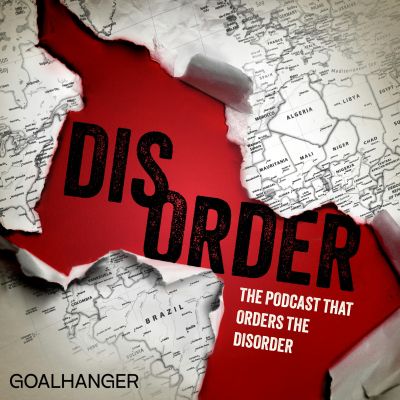Gone are the days of coherent international coordination. Rather than working together to solve pressing crises, many of the world’s most powerful states are actively making those crises worse. The result? We’re living through a novel historical era: The Global Enduring Disorder. The Disorder podcast teases out the key principles that connect seemingly disparate challenges: from Climate Change to Tax Havens, to Unregulated Cyberspace, to the Wars in Ukraine, Syria, and Libya. Jason Pack, NATO Foundation Senior Analyst, and Alexandra Hall Hall, a former British Ambassador, discuss with world-leading experts, senior diplomats and cultural icons, the fundamental principles lurking behind today’s global issues. At the conclusion of each episode, they will be proposing inventive, win-win solutions to the globe’s most pressing challenges aka, ‘Ordering the Disorder’. Twitter: @DisorderShow Website: https://natoandtheglobalenduringdisorder.com
https://natoandtheglobalenduringdisorder.com
Gesamtlänge aller Episoden: 1 day 13 hours 37 minutes
episode 38: Ep38. Could Germany and South Korea go nuclear?
Putin’s nuclear threats over Ukraine and the constant potential of an Iranian/Israeli escalation have brought concerns over nuclear proliferation back up the geopolitical agenda. Western-aligned Asian countries – like South Korea and Saudi Arabia – have begun talking openly about whether they might need their own nukes. Meanwhile, even Germany – one of the most avowedly anti-nuclear countries in Europe – is now having a new debate about whether there should be a “Eurobomb”...
episode 37: Ep37. Former Armenian President Sarkissian (Part II) on: Can a Club of Small States Order the Disorder?
Small states like Qatar, Ireland, Singapore, Jordan, and Botswana are thriving in our disordered world. They’re smart, agile, and are implementing novel solutions to the challenges of the 21st century. So what can the globe learn from them? In part 2 of his conversation with Dr Armen Sarkissian - Armenia’s former president and prime minister – Jason discusses Armen’s book, ‘The Small States Club: How Small Smart Powers Can Save the World’...
episode 1: Ep36. Former Armenian President Sarkissian (Part I) on: Armenian Genocide Remembrance Day
April 24th marks Armenian Genocide Remembrance Day, but the tragic Ottoman massacres of Armenians of over a century ago have been largely forgotten in mainstream Western consciousness. Why? In the first of a two-part series, Jason is joined by Dr Armen Sarkissian, a world-renowned theoretical physicist, diplomat, and businessman. He was Armenia’s president from 2018 to 2022 and also its prime minister from 1996 to 1997...
episode 35: Ep35. Israel Strikes Back: Foolish Revenge or Calculated De-escalation?
In the early morning hours of 19 April, American officials told major news outlets that an Israeli missile had struck central Iran near its nuclear sites. No one was harmed. Officially, the Israelis are not claiming to have attacked; and Iran is not claiming to have been attacked. It is distinctly possible that this pinprick strike combined with denials on all sides will satisfy both parties and avert further retaliation...
episode 34: Ep34. The Battle for Taiwan
Taiwan is not only the epicentre of the world’s semi-conductor industry and a vibrant democracy. It is arguably the most important square on the chessboard of East Asian geopolitics. And the Taiwanese have watched very carefully how China has absorbed Hong Kong. The ‘one country, two systems’ mantra was a total failure. China is not planning a peaceful union with Taiwan. China is building its military at a rate not seen since World War II...
episode 33: Ep33. Iran attacks Israel: Start of the Wars of Gog and Magog or an opportunity for regional cooperation and de-escalation?
In the early morning hours of April 14th Iranian drones and missiles were launched towards Israel. The launch was framed as retaliation for an Israeli attack on the Iranian diplomatic compound in Damascus on April 1st. Nearly 99% of the projectiles were intercepted...
Bonus Episode: Oh Yeah-Woman: who is winning the narrative battle in Yemen, the Red Sea, and Gaza?
A decisively new kind of maritime terrorism has now emerged. Last weekend, two more British-linked ships were attacked in the Red Sea by Houthi pirates. This comes after the sinking of the Rubymar on March 2nd, which released 21,000 metric tons of ammonium, constituting a major ecological disaster. Jason is joined by Laura Cretney: a Yemen expert and founder of Pink Jinn, an online marketplace focused on supporting small businesses and communities affected by conflict in the MENA region...
episode 32: Ep32. The Caribbean: Global Enduring Paradise or crossroads of the Global Enduring Disorder?
Beneath the Caribbean’s idyllic seafronts and sandy beaches lies a darker truth. Illicit money flows, corruption, and organised crime leave these small states hollowed out and open to state capture. In fact, the failure of Caribbean states to provide services to their populations and to generate income has led some of them to sell their sovereignty to their highest bidder...
Bonus Episode: Which country is more Disorderly – The UK or US?
In this bonus episode, Alex and Jason catch up after a long absence and chew the fat. They discuss the tradeoffs of life in the US vs UK delving into the Convenience vs Inspiration dichotomy...
episode 31: Ep31. Is India a neopopulist Disorderer or a potential Orderer?
India is arguably the world’s only rising great power. As the world’s largest democracy and soon to be third largest economy it is the globe’s most serious aspirant for becoming the 6th permanent member of the UN Security Council. Despite this economic and foreign policy heft, since independence in 1947, India has stridently resisted being aligned with any one particular geopolitical “camp”...
